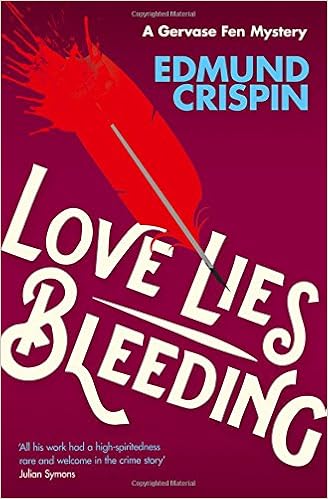
I'm reading up on Edmund Crispin at the moment. It's always a pleasure to read such an entertaining writer, and the forthcoming Essex Book Festival, when I'll be taking part in a panel (with, among others, Crispin's biographer David Whittle) focused on Crispin's work. It will be a long journey to Southend, but I had a great time at the Festival a couple of years back, and I'm looking forward to this one.
Anyway, what about the book? Well, Love Lies Bleeding was published in 1948, and it's an excellent example of the traditional detective novel. Crispin offers all the classic ingredients - an elaborate alibi, more deaths than one, an appealing amateur detective, a chase, and clever fair-play clueing. There's plenty of humour, and literary heritage plays a central part in the storyline. Yes, you can take it than I'm a fan of this book, even if the complications of the plot do take some explaining at the end.
The book has a school setting, like so many vintage mysteries: Gladys Mitchell, Nicholas Blake, James Hilton, Agatha Christie, and R.C.Woodthorpe among others all saw the potential of the school (and I mean, of course, the fee-paying private/public school, not a state school of the kind I attended) as a setting for a murder mystery. It provides for a "closed circle" of suspects, and also a setting in which tensions and jealousies can erupt into violence.
Gervase Fen has been invited to give a speech at Castrevenford School, a boys' school, and his arrival coincides with the mysterious disappearance of a girl from the local girls' school. Soon, two murders are committed, and Fen fears for the safety of the missing girl. Superintendent Stagge is all too grateful for his help, and the plot thickens further when a young man on a walking tour discovers a third body. It's all done with rare skill. My only regret is that Crispin's active career as a crime novelist was so short.
6 comments:
Why was his career as a writer short?
Unfortunately, he was a heavy drinker, and that coupled with poor health contributed to a difficult life which ended when he was in his 50s. He did write one more novel after a very long silence, The Glimpses of the Moon, but it wasn't great. There's a very good biography by David Whittle.
Another good school mystery is Rupert Penny's Sweet Poison. I think it's his best book, albeit rather conventional compared to his full-out puzzle stuff like She Had To Have Gas.
Thanks, Art. A long while since I read Sweet Poison but I remember enjoying it.
Thanks for the review Martin. :) Could I ask which of Crispin's novels would you rank at the top? I've only read 'Love Lies Bleeding' and 'Case of the Gilded Fly', and in both instances the humour distracted me from the puzzle. In fact, 'Love Lies Bleeding' has one of my favourite characters in Vintage mystery writing: the bloodhound!
I've sometimes said that The Moving Toyshop is my favourite, but I might revisit that opinion as I re-read them. But the central notion of the toyshop that moves is so appealing, as is the Oxford setting.
Post a Comment